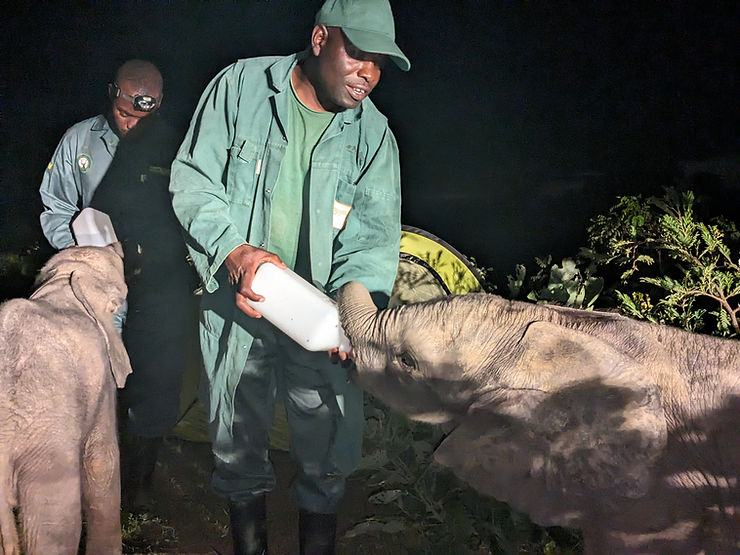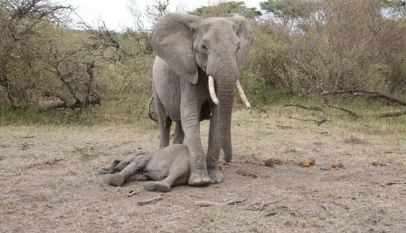
The elephants were victims of a tragic conflict between humans and wildlife, where their herds had been disrupted by clashes with human settlements. In these situations, elephants, like many other wild animals, can become separated from their families, either through injury or as they are driven away from areas where they once roamed freely. For the three young elephants, this separation marked the beginning of an uncertain fate.

The first calf, a young elephant named Kasungu, was found wandering aimlessly, disoriented and confused, near the border between Zambia and Malawi. Rangers had been tracking the movements of elephant herds using satellite technology, hoping to reunite any orphaned calves with their families. Kasungu’s story, however, was different. She had already lost her family and was wandering alone in the wild. When the rangers found her, they knew they had to act quickly. The first step in her rescue was to safely reunite her with her family, and after several attempts, a remarkable success was achieved: Kasungu was brought back to her herd, where she would be protected by the safety of familiar faces and the watchful eye of the elders in her family.

But Kasungu’s was only one of three tragic tales. A few days later, the rangers received reports of two more baby elephants that had been found in desperate conditions. One was trapped in a deep ditch, its tiny body showing signs of distress and injury, including a deep machete wound that had left it weak and vulnerable. The second calf, barely a month old, was found near a remote clinic, seemingly abandoned and too frail to move far. Both were clearly in urgent need of care, and the rangers knew that the window to save them was quickly closing.

With the elephants’ health deteriorating by the hour, the decision was made to fly them to Lusaka, the capital of Zambia, for immediate medical attention. The journey to Lusaka was not one that could be undertaken by land; the calves were far too weak to endure the long, grueling trip by truck. Instead, a small plane was arranged to transport them, where they would be safely secured on specially designed mattresses. These “elephant seat belts” ensured they were safely strapped in for the flight, minimizing any further stress or injury.
As the plane soared through the sky, the baby elephants lay quietly, comforted by the presence of their keepers. They were surrounded by warmth and care, a stark contrast to the cold, lonely wilderness they had been plucked from just days before. The flight was a quiet, emotional one. For those on board, the stakes were high, knowing that the future of these fragile creatures rested in their hands.

Upon arrival in Lusaka, both elephants were rushed to the Elephant Nursery at the Lusaka National Park, a sanctuary dedicated to rescuing and rehabilitating orphaned elephants. This facility would be their home for the foreseeable future, offering them a safe space to heal and recover under the constant watch of expert veterinarians and caregivers. The two calves, named
Lumezi and Kasungu, were placed under 24-hour care, their every need attended to with tenderness and precision.

Kasungu, though still recovering from the trauma of being abandoned, began to show signs of improvement. She ate well, responded to her caregivers, and slowly regained strength. The first few days were crucial for her recovery, but the efforts of the team in Lusaka paid off. Slowly but surely, Kasungu began to regain her vitality. Her eyes, once filled with fear and confusion, now held a glimmer of hope, as she responded to the kindness and care of her new family of keepers.
However, Lumezi’s journey was not as smooth. The machete wound she had sustained while trapped in the ditch was serious, and she remained frail and weak. Despite the best efforts of her caregivers, her recovery was slower. Lumezi’s body was exhausted, and the emotional toll of being abandoned at such a young age had taken its toll on her spirit. Yet, her caretakers refused to give up. They continued to work tirelessly, monitoring her every move and providing round-the-clock care to ensure she stood the best chance at survival.
It wasn’t just the physical recovery that the calves needed. The emotional scars left by their traumatic experiences were just as significant. Both Kasungu and Lumezi were offered as much love and comfort as they could handle, with keepers spending countless hours interacting with them, speaking to them, and even singing soft lullabies to soothe their anxieties. Slowly, Kasungu and Lumezi began to open up, responding to the care and attention they were receiving.
As time passed, the two elephants began to form a bond with their keepers. They were no longer the frightened, vulnerable creatures they had been when they first arrived. They were healing, both physically and emotionally, and their spirits were slowly lifting. However, the team at the Elephant Nursery knew that this was just the beginning. Their ultimate goal was not to keep Kasungu and Lumezi in captivity forever but to ensure they were strong enough to return to the wild, where they belonged.
With each passing day, the rangers and veterinarians worked towards that goal. They began preparing the two elephants for the eventual release back into their natural habitat. This process would take time, patience, and careful planning. But for now, the focus remained on providing Kasungu and Lumezi with the care they needed to become strong, healthy elephants once again.
As the days turned into weeks and the weeks into months, Kasungu and Lumezi continued to thrive in their new home. The hope for their future was brighter than ever, and the dedication of the people who had saved them kept them going. There was still much work to be done, but for the first time in their lives, these two baby elephants were no longer alone. They were surrounded by love, care, and a team that would stop at nothing to ensure they had a chance at the life they deserved.
The rescue of these three elephants is a testament to the strength of compassion, teamwork, and perseverance. It shows that even in the face of adversity, there is hope. And as the rangers, veterinarians, and caregivers continue their work, one thing is certain: Kasungu and Lumezi will one day return to the wild, where they will roam free once again, their journey a reminder of the incredible power of kindness.






